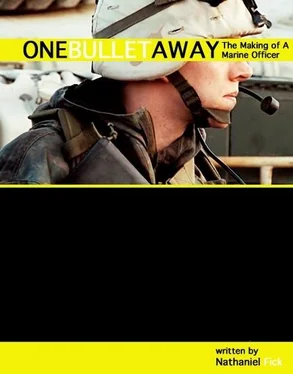We looped around a circular drive leading up the hill and parked near the palace’s front door. The view was even more spectacular than I had expected. We gazed across the entire sweep of Babylon, over the palms, and past the Euphrates. The next day, another recon platoon stood in the same place and watched in horror as a Marine helicopter crashed into the river and sank, killing its four-man crew and one Marine who had jumped in to save them. But our afternoon was peaceful, and I could almost understand Saddam’s delusion, from that perch, of keeping the whole country under his thumb. We crossed the threshold through wooden doors two stories high.
The entry hall seemed modeled on a cathedral, but the power conveyed to visitors was not of God, but of Saddam. We tromped across an inlaid marble floor, marveling at a chandelier nearly the size of a Humvee. Carved panels of dark wood stood inside deep alcoves in the walls, like statues of saints. Doors led to long hallways promising riches. A grand staircase rose to balconies overlooking the ground-floor rooms. Everything was marble, crystal, or mahogany. One ceiling displayed a mural showing the sweep of Iraqi history, from the Ishtar Gate to Saddam Hussein. The whole place was garish, superficially impressive like a Las Vegas hotel rather than awe-inspiring like a medieval cathedral. It represented no grand idea or human triumph. Men from the First Marine Expeditionary Force headquarters camped in the upstairs rooms, and filthy cammies floated in a marble tub where, perhaps only weeks before, Saddam had enjoyed one of his final soaks.
* * *
A week later, we packed up for the five-hundred-kilometer drive to Kuwait. Leaving at six P.M. to avoid the midday heat, we passed through As Samawah, where convoys had been mobbed and shot at on previous evenings. The town slept through our passage, and we saw only dogs barking under streetlights. We paralleled the Euphrates River toward Nasiriyah, and despite the warm air, I shivered when I saw its lights on the horizon. Memories of our first visit, exactly two months earlier, came surging back. As we refueled on the highway, scorpions scuttled across the pavement, casting shadows in the headlights which made them look a foot tall. I drove a long leg through the dead hours of early morning, passing near the Ar Ratawi railroad bridge and the oil fields of Rumaila. After Gunny Wynn took over, I fell asleep in the passenger seat and woke up in the sunlight of the empty Kuwaiti desert.
Anyone who looks with anguish on evils so great must acknowledge the tragedy of it all; and if anyone experiences them without anguish, his condition is even more tragic, since he remains serene by losing his humanity.
— AUGUSTINE OF HIPPO
ISTROLL IN THE SUMMER SUNLIGHT at a lakeside family reunion. Young cousins splash in the water, while adults laugh over drinks. In the distance, a band plays. I approach people to join the conversations, but no one can see or hear me. I am invisible to them. Looking down at myself in confusion, I see that I wear desert camouflage and carry a rifle slung across my chest. Blood soaks my clothes.
For months after coming home, this dream woke me. Not every night, only a dozen times in all, but often enough to make sleep an act of will. Sometimes I got up and took a walk. Sometimes I did pushups on my bedroom floor until I collapsed in exhaustion. Mostly, though, I stared at the ceiling and tried to think of something, anything, else.
The homecoming story is a cliché. From the moment we arrived in Kuwait, I felt that I knew what would happen next. One Marine in a different battalion cracked almost immediately and shot another Marine in the chest during a touch football game. We took off from Kuwait City aboard a commercial airliner. The passengers cheered as the wheels left the ground. My seat was clean, the food delicious, and the stewardesses pretty. Some people talked, most slept, and I stared out the window. The pyramids at Giza slid past in the morning light. In Frankfurt, I stood at the terminal door for twenty minutes, just marveling at the green grass. We entered American airspace north of Syracuse, New York, on Tuesday, June 3, 2003, at two P.M. The pilot said, “Welcome home,” and we cheered again.
When we landed at the Air Force base in Riverside, California, I walked down the stairs to the tarmac. There were the grills where the Red Cross had cooked hamburgers for us, the hangar where we’d slept on the floor, and the television still blaring at the rows of empty chairs where we’d watched the space shuttle burn up. Outside, headlights moved on the freeway. A Tuesday evening commute. Nothing had changed.
The delusion persisted through our bus ride back to Camp Pendleton and the midnight reunion with our families on a basketball court behind the battalion’s offices. I locked my weapons in the armory but kept the holster on my thigh to hide a bloodstain from the boy at Qalat Sukkar. People waved signs and cheered, and we played the returning heroes. Sergeant Patrick stood quietly, apart from the crowd, dressed in starched cammies and wearing boots for the first time in two months. He wore them, despite the pain, because he thought it was right to greet the platoon while wearing his proper uniform. We all hugged him, along with our mothers and fathers and wives and girlfriends, because he was family.
I felt lonely that night in the hotel room — no radios hissing, no stars overhead, no Marines standing watch beside me. I slept in two-hour chunks. Before dawn, I woke up and took my second shower of the night, just because I could. A dark brown face stared back from the bathroom mirror. I saw lines on my forehead I hadn’t noticed before. The horseshoe still hung around my neck on its loop of parachute cord. I slipped it up and over my head for the first time since Christmas.
Delusions of normalcy continued as I settled back into my daily routine. I stopped for coffee on the way to work. I got stuck in traffic and went to the grocery store to refill my refrigerator. Life’s simple conveniences kept me so grateful that I hardly thought about the war. The return felt seamless. Sometimes I imagined that the four-month interlude had been a dream I could just forget.
But bit by bit, little things dragged me back. On a Saturday afternoon, a Marine friend who had not been in Iraq invited me to go skeet shooting with him at Camp Pendleton’s range. I accepted reflexively, thinking nothing of it. I noticed him looking at me as we drove up the freeway. Finally, he spoke.
“What the hell are you doing?”
I was swerving randomly under overpasses. In Iraq, that made it harder for people above to drop hand grenades into the Humvee.
“Sorry. I wasn’t paying attention.”
When we got to the range, I stood on the firing line with a shotgun and a bag of shells. Suddenly, I had no interest in shooting skeet. I had last fired a gun shortly before midnight on April 1, on the highway north of Al Hayy.
I sized people up on the street, looking head to toe for the telltale bulge of a pistol or a bomb. Not having a tourniquet and IV bag nearby made me vaguely uncomfortable. I ate up every scrap of news about the men still fighting but preferred not to talk about it. I cried sometimes for no reason at all. When a driver cut me off in a merge lane, I visualized, without emotion, pulling his head back and cutting his throat with my car key. On the Fourth of July, a firecracker sent me diving behind a car door, reaching for a pistol that wasn’t there. I felt older than my father. And I had the dream.
I thought I was losing my mind. The only way I knew I was still sane was that I thought I might be going crazy. Surely, that awareness meant I was sane. Crazy people think they’re sane. Only sane people can think they’re crazy. I was reduced to taking comfort in a tautology.
Читать дальше












